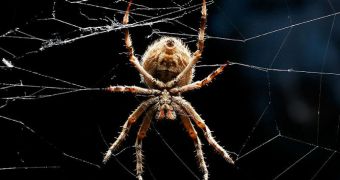Scientists proposed some time ago that some of the most basic and widespread phobias people have may be innate, as in inherited even before birth. The most common ones are arachnophobia (fear of spiders) and ophidiophobia (fear of snakes), and investigators say that this makes perfect sense from an evolutionary point of view. New humans born in the wild need to be instinctively able to protect themselves against venomous creatures, thus upping their chances for survival. A new study, done on crickets, demonstrate that some of the offspring tend to inherit their mothers' fears.
In other words, if mother crickets had devastating experiences with spiders, and survived, their fear would transmit to their offspring. To test this, researchers constructed a variety of terrains, in which they placed pregnant crickets. They also added a wolf spider, which had its fangs covered in wax, so as not to kill the other insects. Some crickets were exposed to the predator, while others were left unscathed. All were then allowed to lay their eggs, and the science group began observing the differences in behavior between the two sets of offspring.
They noticed that the ones born from eggs of mother that had not been exposed to the wolf spider were a lot more reckless, and did not have any instinct on how to handle an encounter with a spider. On the other hand, members of the other group, which came from frightened mothers, were more likely to display instinctual defensive behaviors, such as freezing when they encountered web or spider feces. This is a very common mechanism for conservation in the wild, as standing still minimizes the chances of a spider seeing the cricket. This group of offspring was also 113 percent more likely than the other one to immediately seek shelter and stay put, which also increased their chances of survival.
“The transfer of information from mother to offspring about predation risk, in the absence of any parental care, may be more common than one might think,” explains University of South Carolina Upstate expert Jonathan Storm, quoted by LiveScience. The scientist cooperated closely with colleague Steven Lima, from the Indiana State University, on the investigation. The team published their results in the latest issue of the respected scientific journal American Naturalist. The researchers add that further work will now be needed to determine precisely how fear is passed down from generation to generation.

 14 DAY TRIAL //
14 DAY TRIAL //